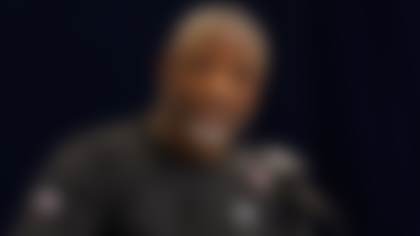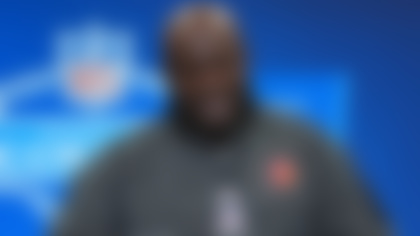The Divisional Round has come and gone, and only four teams remain in Super Bowl contention. Joining the usual suspects, Tom Brady's Patriots, in next Sunday's Championship Games are three unlikely quarterbacks leading three written-off teams. Here are some of our big takeaways from this weekend:
- Vikings fans knew the feeling when Wil Lutz's 43-yard field goal split the uprights with just 25 seconds remaining. Disappointment. Shock. Acceptance. Minnesota had entered the second half up 17 points until Drew Brees, Michael Thomas and Alvin Kamara marched repeatedly down the field, wiping that lead away completely with a Kamara TD catch with three minutes to go. When Kai Forbath knocked in a franchise-record 53-yarder with 90 seconds left, it looked like maybe, just maybe Minnesota had exorcised its kicker demons of years past. But New Orleans' ensuing drive and Lutz's score quickly wiped those sentiments away. Same old Vikings.
What happened next will be, and is already, the stuff of Minnesota legend. With time running out and Minnesota on its own 39-yard line, Case Keenum connected with his top target, Stefon Diggs, on a prayer of a pass. Diggs high-pointed and reeled in the ball and, on his way down, escaped the armless tackle of Saints rookie Marcus Williams. With no Saints defender ahead of him, Diggs sped off toward the end zone, sealing an improbable back-and-forth win and sending U.S. Bank Stadium into utter bedlam.
- There would have been no dramatic topsy-turvy finish without a furious comeback from the Saints. Brees shrugged off a miserable first half, in which he threw two picks and posted a 0.0 passer rating in the first frame, to lead four scoring drives in five attempts in the second half to make this thing interesting. While New Orleans' playmakers were held mostly at bay through the first 30 minutes, they exploded for key gains in the second half. Thomas and Kamara, the future of football in New Orleans, combined for three second-half touchdowns. Thomas, in particular, was a lightning rod, and if things had gone differently, would have been Public Enemy No. 1 in Minneapolis. Thomas redirected the trajectory of this contest when he collided with -- and debatably targeted -- Vikings safety Andrew Sendejo on a red-zone route, knocking him out of the contest. On the very next play, Thomas beat an irate Xavier Rhodes for a TD, and did it again on New Orleans' drive. The Saints' anemic first half sank their hopes of controlling this game instead of playing from behind, but the future is bright in New Orleans with Thomas and Kamara leading the way. Whether Brees can lead them this close to glory again before retiring will be the question.
- The game's most complete unit resides in Minneapolis. Long overlooked for a variety of reasons -- Keenum at QB, few household names, defense-first team -- the Vikings held on in part due to an amazing first-half performance from their All-Pro defense. With Pro Bowlers and playmakers at every level, Minnesota frustrated Brees and Co. from the get-go, creating mismatches and disrupting one of the league's more dynamic attacks. Everyone is capable of making plays in Minnesota. Sendejo made an insane adjustment to reel in Brees' first pick; Everson Griffen tipped an interception at the line, without even looking at it; and the secondary combined for eight passes defensed on the night. Rivaled only by Jacksonville's defense and New England's offense, there is no better unit remaining -- no group that plays more complementary, total football -- in the postseason than the Vikings' defense.
*-- Jeremy Bergman *
- The fingerprints of destruction were all over Pittsburgh's defense from the opening snap. The Jaguars came out of the gate blasting through a vacant Steelers front seven that seemed lost from start to finish without injured linebacker Ryan Shazier to lead the way. Jacksonville's game-opening, eight-play, 66-yard march saw quarterback Blake Bortles unfurl crisp, play-action lobs and lean on the team's bruising ground game. That opening drive was capped by coach Doug Marrone displaying major onions on fourth-and-goal from the 1-yard line, dialing up Leonard Fournette for a diving score that set the tone right away for Sunday's fascinating upset.
- Buried in a 21-0 hole in the first half, Pittsburgh's greatest nightmare was in full bloom, with all the old questions and doubts creeping back: Is this a team worthy of the Super Bowl? Able to handle their own business in the biggest spot possible? Or a roster destined to once again tap the self-destruct button come January?
The answer, for Steelers fans, is comprehensively grim.
Early mistakes backed Pittsburgh into a corner. Ben Roethlisberger's fourth pass of the day landed in the arms of Jacksonville linebacker Myles Jack, who stopped on a dime to cradle the ball at Pittsburgh's 18-yard line. One play later, Leonard Fournette blasted off tackle for a touchdown gallop that put the Steelers down 14-0. When Le'Veon Bell was stuffed on a fourth-down run on the following drive -- an ugly, predictable play-call -- it was fair to wonder if the favored Steelers were in serious trouble. It was more than fair to ask that question again when a subsequent strip-sack of Roethlisberger triggered a 50-yard touchdown return by Jaguars linebacker Telvin Smith, burying the Steelers in a 28-7 hole.
- The amazing Roethlisberger wasn't finished, though, keeping the Steelers alive with an outrageous 469 yards and five scores, including four of the most sensational touchdown throws you'll see all season. Momentum seemed to shift when Big Ben cut Jacksonville's lead to 28-21 with a marvelous 19-yard, third-quarter scoring strike to Le'Veon Bell. Minutes later, trailing 35-21, Roethlisberger shipped a fourth-down laser into the arms of Antonio Brown for a score that officially turned this into the best game we've seen in months. Playing for the first time since Week 14, Brown overcame a slow start to pile up 132 yards and two scores off seven grabs, looking once again like the best player on Planet Earth.
-- Marc Sessler
- This was a victory straight out of a 1980s Bill Parcells game script, with power pushing speed around the field as the Eagles won the battle in the trenches on both sides of the ball. Although the offensive line dominated from the outset, their first-half handiwork was undone by the self-sabotage of four fumbles and a series of Nick Foles misfires. Fortunate to enter halftime down by just one point, the Eagles took control of the contest late in the third quarter with a pair of methodical field-goal drives that totaled 154 yards on 26 plays and 13:39 in time of possession.
- Ten months of planning, practice and game execution came down to one play at the 2-yard line, in large part because Julio Jones beat Pro Bowl safety Malcolm Jenkins for a 20-yard gain to convert a crucial fourth-and-6, this after the catch rule's notorious "survive the ground" clause overturned Mohamed Sanu's third-down conversion. It's fitting that Philadelphia's defense bowed up for four plays with the season on the line after Tevin Coleman's 10-yard run gave Atlanta a first-and-goal opportunity at the 9-yard line. Starting in the second quarter, Fletcher Cox and the Eagles defensive front seven took control of the line of scrimmage, forcing six punts on seven Falcons possessions as Foles' offense found its footing and managed a trio of field-goal drives to grind out the win.
- How did Carson Wentz's stand-in fare? Foles' nightmare of a first half was best encapsulated by a botched interception that went through Keanu Neal's hands and bounced off the safety's knee 12 yards backwards into Torrey Smith's waiting hands for a 20-yard gain. The worst throw of the day was Foles' longest completion of the half, ultimately resulting in a 53-yard Jake Elliot field goal into the teeth of a gusty wind. The second half played out like a pre-game Doug Pederson dream scenario. Foles avoided implosion by hitting simple, easily defined throws on run-pass options and screen passes while the defense kept Ryan and Jones off the field. As shiny as Foles' 100.1 passer rating looks in the box score, his remedial-level work under center remains a question mark for the NFC Championship Game. Make no mistake, it was Pederson's play-calling and Philadelphia's offensive line that were the difference in this outcome. The Eagles will need their quarterback to hit tougher throws to advance to the Super Bowl.
-- Chris Wesseling
- Responding to Marcus Mariota's perfectly orchestrated 95-yard scoring drive late in the first quarter, the Patriots took control of the game with a quick-strike offense that exhausted the Titans' defensive line while generating a trio of second-quarter touchdowns. Play-caller Josh McDaniels adjusted his aerial attack, ditching deep and intermediate throws in favor of a return to the uptempo, short-passing scheme of years past. Dick LeBeau's defense was forced to pick its poison, paying for the early containment of Rob Gronkowski and Brandin Cooks in conceding death by a dozen paper cuts from Dion Lewis, James White and Danny Amendola. Tom Brady shrugged off a slow start to lead the offense's most impressive all-around performance in at least three months, overtaking Brett Favre as the oldest quarterback ever to win a postseason game.
- An outclassed underdog such as the Titans must play a nearly perfect game to beat the powerhouse Patriots in New England. After hanging tough for one quarter, Mike Mularkey's squad was undone by a mistake-prone, one-dimensional offense, a lack of playmakers on defense, bad breaks on penalties and glaring deficiencies in play-calling and clock management. Credit Matt Patricia's bend-but-don't-break defense for shutting Mariota down for the final three quarters, registering a season-high eight sacks. The Patriots' coaching stability and experience in big games shined through. It will be interesting to see if that precision execution changes next year with McDaniels and Patricia in high demand to fill head coaching vacancies.
- So much for Brady's so-called slump to close out the regular season. While the MVP favorite's production tailed off in December, that troublesome stretch also featured exquisite ball placement and big-time throws in a comeback victory over the Steelers. In the other three games, beginning with the Dolphins' unlikely Week 14 dominance, it was impossible to untangle Brady's own Achilles injury, the absences of key receivers and running backs and the deleterious effects of bone-chilling weather on the passing game. Removed from the injury report this week, Brady showed early-season form with improvisational plays, highlighted by a backfoot floater to Danny Amendola, converting a red-zone third down early in the fourth quarter. He extended his own postseason record with a 13th 300-yard game, generating a 102.5 passing rating on 53 attempts. Brady will now compete in his seventh-consecutive conference championship game and 12th overall, not only more than all but three NFL franchises (Steelers, 49ers, Cowboys) but also more than quarterbacks Peyton Manning and John Elway combined.
-- Chris Wesseling











